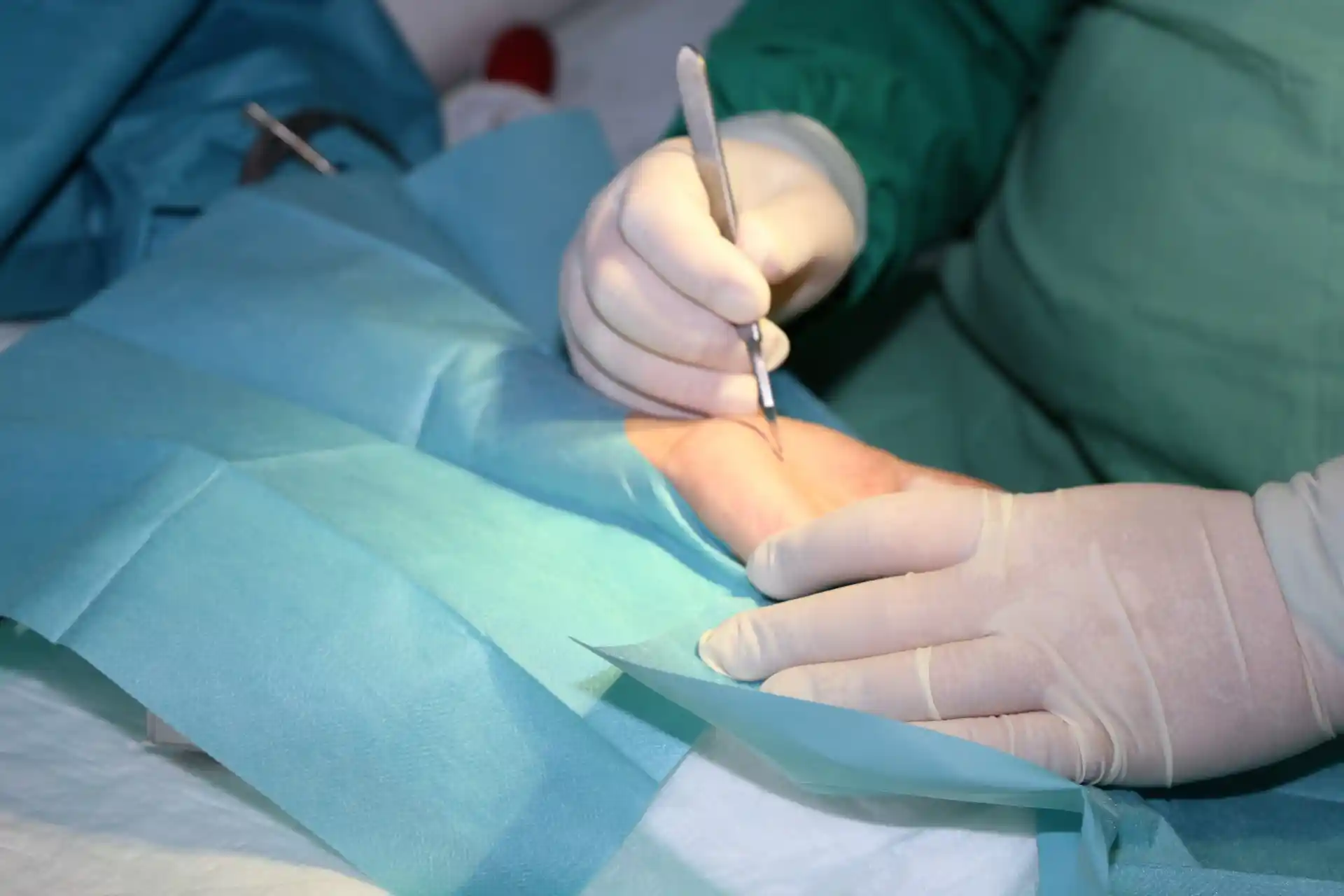Why Does My Skin Crawl?
Many people experience a strange, tingling sensation—often called formication—where it feels like insects are crawling on or under the skin.
Research suggests that this unnerving experience can stem from varied causes, including nerve compression, withdrawal from substances, menopause, or even mental health conditions (Medical News Today).
Many of these causes are treatable, and relief is typically within reach.
Below, you’ll find clear steps to help you understand what might trigger these sensations, how they can relate to issues like carpal tunnel syndrome or ulnar tunnel syndrome, and what you can do to ease them.
Whether you’re on a journey to recover from nerve compression or just want to keep healthy, these insights can guide you toward comfort and peace of mind.
Recognize The Feeling
Formication is a form of tactile hallucination—meaning your brain tells you that something is touching or crawling on your skin when nothing is actually there (Cleveland Clinic). This sensation can appear suddenly, flare at night, or persist for days.
It may manifest as:
- Tingling or pins-and-needles feelings
- Subtle itching in localized areas
- A prickly, antlike crawling under the skin
If you’ve also noticed tingling in your wrist or elbow region, you might have an underlying nerve compression syndrome.
In many cases, nerve compression—such as carpal or cubital tunnel issues—can amplify abnormal sensations that may feel like bugs crawling.
Understand Common Causes
Addressing how to stop skin crawling feeling starts with pinpointing why you have it in the first place. While personalized care may be needed, the causes often fall into these broad categories.
Nerve Compression Or Damage
Carpal and cubital tunnel syndromes are classic examples of nerve compression that may produce odd sensations like numbness, tingling, or even a crawling feeling.
The median nerve, which runs through the wrist, and the ulnar nerve, which travels along the elbow, can both become trapped or inflamed, leading to discomfort.
- Median nerve compression can trigger tingling in your thumb or first two fingers.
- Pinched nerve in elbow may cause a peculiar tingling or crawling sensation down the forearm and ring or pinky fingers.
Read more on other conditions caused by nerve compression or damage such as sciatica and piriformis syndrome.
Substance Use And Withdrawal
Prescription medications, recreational drugs, and alcohol can also bring on formication.
Cocaine or methamphetamines sometimes cause intense “coke bugs” or “meth mites”—vivid crawling sensations that can lead to skin-picking and sores (Cleveland Clinic).
Alcohol withdrawal is another potential culprit.
Hormonal Changes And Menopause
During menopause, you may encounter formication due to shifting hormone levels. This can manifest as night sweats, hot flashes, and a crawling feeling under your skin.
If you’re already contending with tension in your wrists or elbows, these sensations may feel even more pronounced.
Underlying Medical Or Mental Health Issues
Mental health conditions involving psychosis (like schizophrenia or severe bipolar disorder) can trigger tactile hallucinations.
Certain neurological disorders (such as multiple sclerosis or Parkinson’s disease) may also bring on a skin crawling feeling.
Additionally, depression and anxiety can heighten your perception of discomfort, so you might be more aware of every tingle, itch, or pinch.
Other Triggers
- Medication side effects (e.g., certain antibiotics or Parkinson’s disease drugs)
- Stress amplifying mild sensations
- Fibromyalgia or other chronic pain syndromes
If you notice these sensations alongside a tingling left arm, talking with a healthcare provider is important if the feeling persists.
Check out our article on related conditions that affect the skin such as Ehler's-Danlos Syndrome.
Try Immediate Relief Strategies
Once you understand potential causes, you can explore strategies to ease the crawling sensation. Whether drug use or nerve compression is at play, a few practical methods often provide short-term comfort.
Soothe Your Skin
Many healthcare professionals suggest that temperature-based strategies can calm nerve-related sensations. Formication often responds well to a cooling or soothing approach:
- Apply Cool Compresses
- Lay a chilled towel or ice pack over the area.
- A brief cool sensation may disrupt your nerves’ alarm signals.
- Use Menthol Creams
- Menthol lotions or barrier creams can numb the surface.
- This gentle cooling effect can override that crawling feeling.
- Add Moisturizers Daily
- Tackle dryness that can make any itching feel more intense.
- Choose unscented products to avoid extra irritation.
Adjust Your Daytime And Bedtime Routines
Quick relief often comes from small habit tweaks:
- Schedule Your Deep Work
- If you frequently rest your wrists on a desk, try neutral wrist positioning or a carpal tunnel brace.
- This supports nerve health by reducing compression.
- Use Mindful Movement
- Basic carpal tunnel exercises or gentle stretches can enhance circulation.
- A few minutes of focused movement throughout the day might reduce nerve irritation.
- Support A Healthy Sleep Environment
- Keep the room at a moderate temperature.
- Switch to loose-fitting clothing so fabric doesn’t aggravate sensitive skin.
These brief lifestyle changes are not only simple, but they often ease overall stress as well.
Consider Professional Help
Sometimes, home interventions aren’t enough. If you see no improvement, connecting with a healthcare provider can help you find tailored solutions.
Get A Thorough Evaluation
A provider may request physical exams, blood work, or nerve-conduction studies. If you suspect nerve compression, you could explore a carpal tunnel syndrome test designed to pinpoint median nerve damage.
If an ulnar nerve is affected, an evaluation might uncover cubital tunnel syndrome or confirm the need for cubital tunnel release.
Depending on your symptoms, your provider might also assess your mental health or look for signs of a medical condition like a stroke or overdose risk (Cleveland Clinic). It’s crucial to seek immediate care if:
- You or someone you know shows signs of severe mental distress or psychosis.
- You have stroke-like symptoms (face drooping, arm weakness, slurred speech).
- You suspect a drug overdose or withdrawal complication.
Explore Medical And Therapeutic Treatments
These treatment options should be treated as a general guideline, always consult with a healthcare professional for personalized guidance on formication and nerve compression treatment that is right for you.
Depending on your case, professionals might recommend:
- Antipsychotic Medications
- These can help people whose formication stems from psychiatric conditions.
- In certain studies, up to 88% of individuals see partial or total remission of symptoms with these medications.
- Antidepressants
- SSRIs sometimes prove effective, with research suggesting nearly 79% of people report symptom relief (Verywell Health).
- They could also assist with anxiety or depression that heightens skin crawling sensations.
- Hormone Therapy
- In the case of menopause-related formication, treatments like hormone replacement therapy may help (My Menopause Centre).
- Specialized Nerve Care
- If you face ongoing compression, carpal tunnel surgery, or targeted techniques like a cubital tunnel syndrome brace might be part of a bigger plan.
- In certain scenarios, your provider might suggest advanced therapies, especially if you have other nerve issues like median nerve injury.
- Counseling And Therapy
- Psychological support can be invaluable, particularly if stress, anxiety, or substance use intensifies your discomfort.
- Cognitive behavioral therapy and other counseling approaches offer extra coping tools.
Maintain Healthy Habits For Long-Term Relief
A balanced lifestyle and ongoing self-care can keep these unnerving sensations at bay. Even if you’ve resolved specific nerve issues, a holistic approach supports your entire body.
Prioritize Stress Management
Chronic stress can amplify nerve signals and heighten your awareness of every itch or tingle. Simple techniques like meditation, breathing exercises, or regular walks can relieve tension.
If your daily routine involves keyboard work or repetitive elbow movement, consider adding brief stretch breaks to keep nerves healthy.
Support Your Nerves With Nutrition
While diet alone can’t guarantee zero tingling, research points out that certain nutrients benefit nerve function. Aim to include:
- B Vitamins (B6, B12, folate) for nerve repair and signal transmission.
- Omega-3 Fatty Acids from fish or flaxseeds to lower inflammation.
- Antioxidant-rich fruits and vegetables to help curb oxidative stress.
If you’re not sure whether your diet is fueling healthy nerve function, talk to a nutritionist or your doctor. Nutritional deficiencies can worsen formication by making your brain and nerves more sensitive to unusual sensations.
Keep Physically Active
Physical activity has been tied to improved nerve health, reduced stress, and better mental well-being. With your doctor’s okay, incorporate gentle routines like:
- Walking or Cycling
- Encourages blood flow to extremities.
- Minimizes stiffness around wrists and elbows.
- Targeted Wrist Or Elbow Exercises
- See your therapist or physician for customized carpal tunnel exercises.
- Light strengthening or stretching takes pressure off vulnerable nerves.
- Mindful Posture Checks
- Ensure your wrists stay neutral while typing.
- Use ergonomic setups to lessen nerve tension.
Stay Alert To Changes
It’s wise to track your symptoms over time. If you suddenly note an increase in crawling feelings, or if they shift from mild to severe, consult your provider.
Choose one small change—like adding a few stretches to your morning routine or scheduling a checkup. A calmer, more comfortable body is often just a handful of steps away.
Most importantly, remember you’re not alone in seeking relief. The data shows many effective solutions exist, and you can reclaim your comfort with informed care and supportive daily habits. You’ve got this.
Seek RELIEF®
RELIEF® is a science-backed, targeted approach that targets dysfunctional fascia—connective tissue that may contribute to nerve compression.
Using a minimally invasive technique called hydrodissection, RELIEF® releases stuck or adhered layers of fascia and soft tissue. This process may help relieve the tingling, numbness, and pain often associated with conditions like carpal or cubital tunnel syndrome.1,2,3,4,5,6
If you are in the area and looking for a Miami hand and wrist pain specialist, contact us today to schedule a consultation and learn more about how RELIEF® may help with compressed nerves and cubital/carpal tunnel symptoms.

.jpg)




.svg)